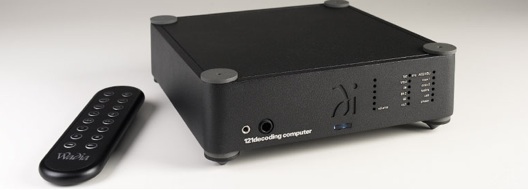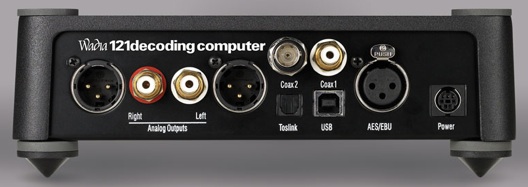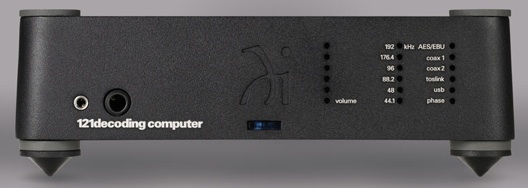Wadia 121 Decoding Computer
All about the new Wadia 121 DAC and preamplifier. Do you want to enjoy vastly better digital sound? The new Wadia 121 is a breakthrough product that finally brings high end digital performance to an affordable price level - just NZ$2200. The Wadia will make almost any system sound dramatically better. Which is a bold claim, but one that we can back up because there is a lot to the Wadia and have been spending quality time with this very special machine.
Archived page: January 2016
– Please see the NuPrime range for hot new DACs

In audio-speak, the Wadia 121 Decoding Computer is a high performance DAC/digital preamplifier with a complete set of digital inputs, balanced analog outputs, digital volume control, and a headphone output section. The key is to work out what it will do for you within your system and how best to make the most of its talents.
Up until now, there has been a real gap in the middle ground of DAC design - there are a plethora of high value DACs - NuForce, HRT, Rotel and Cambridge Audio being some of the more notable players. And many much more costly models from major players like Wadia, Meridian and Audio Research that are undoubtedly better. Much of the middle price territory has been occupied by small previously unknown companies that seem to come and go in the blink of an eye - despite internet hype they trade on, many are no better than (and sometimes not as good as) the established under $1000 players.
What we've all been waiting for is some serious trickle-down from a high end company - and after a protracted gestation Wadia have delivered. The 121 always had to be a stunner - reputations are at stake, and the competition is well established. While there were some building blocks in place after the introduction of the Wadia 170 and 171 iPod docks, the 121 is actually a far more ambitious product and actually has more in common with their full sized models.
But back to basics - what do you need a DAC for? Before the advent of iTunes, the iPod and the widespread acceptance of computer based audio, separate DACs were a useful upgrade for CD player performance - this still applies and when connected to virtually any disc player - CD, DVD or BluRay, the Wadia 121 will make your music sound immediately and significantly better - for this alone, the 121 can happily justify it's price. But it will also allow you to painlessly migrate to the world of computer audio.
In the here and now, any computer has the capacity to store and play back huge volumes of recorded music - either from your own CDs or downloaded. The problem is that almost every computer has really poor audio outputs relative to even the most basic hi fidelity system. But what they do have is potentially excellent output on the digital side via the ubiquitous USB connection. It's with this connection that the Wadia is at its very best - we've been taken aback by just how good a job the Wadia does of simply making everything in a recording much, much clearer - every instrument, every lyric is presented in a way that makes other DACs sound muddled and flat. There's depth and solidity that you normally only get to associate with far more costly products. Right now, we're really finding it hard to pinpoint a weakness.
If there is any issue with the Wadia 121 it's that it has more capabilities than you are every likely to fully capitalize on - with multiple inputs covering the full range of types and sampling rates, multiple outputs including balanced and headphone sockets, phase, output level and balance adjustments and a very fine volume control with 120 0.5dB steps via the remote, there can be no quibbles about features not included - the trick is to set it up to get the most out of your particular system. Given the high performance it is capable of combined with the full feature set, you can really consider the Wadia 121 to be a central point in any serious music system. You can literally build a system around it.

In a perfect world, the Wadia 121 connected directly to your computer or laptop, via USB, and running directly into a power amplifier and then your favorite speakers will provide the best sound for least total outlay. While the USB connection is considered best, this in no way implies that the Wadia won't do a stellar job with other inputs - our first experience of the 121 was via Apple Airport Express and an optical lead - it was obvious within a few seconds that this comprehensively blitzed our previous favorite DAC in every way - far more lucid and engaging. Then it just got better as it warmed up.
It's also likely that many 121s will be running into either integrated or preamplifiers rather than a discrete power amplifier - again this isn't a compromise - it just allows you more flexibility. On the other hand, the Wadia running straight into active speakers will sound seriously good too.
Given the Wadia has only been out for a few weeks worldwide as I write this, it might seem a little difficult to grasp just how significant it is as a product - there is really nothing else out there at the price that competes, and even if it were twice the price it would be very hard to name another products that is actually better. In this, the Wadia is very like the NuForce HDP - and they are quite similar in terms of features on the face of it - but the 121 is very much the next step up from the NuForce - a significantly large step we might add.
Now, here's something you might not know about Wadia - while they are very much a US based company, they are in fact owned by Fine Sounds SpA of Milan, Italy, who just also happen to be the owners of Sonus Faber, Audio Research Corporation and Sumiko. It’s a very clear indication of where Wadia fit within the global hifi scene and an affirmation of they very high standards they set. It also explains how they can deliver a product such as the 121 which is such good value - a small player just couldn't achieve the same economies of scale. And needless to say, it makes the Wadia an even more appropriate addition to our range.
A little Q&A for you...
Should I leave the Wadia 121 Decoding Computer with the power on?
The Wadia 121 Decoding Computer is designed to be left with the power on with no harm or wear to the unit. If desired, the front display can be minimized by pushing the display command on the remote control. Leaving the power on allows the circuitry to remain thermally stable, which provides better performance and longer life. Careful listeners will notice that the sound of the Wadia 121 Decoding Computer will improve steadily after the unit is powered-up. A new unit will undergo more dramatic changes when power is applied for the first time. If you turn off your Wadia 121 Decoding Computer for more than an hour, you will find that the unit will undergo a similar, but less dramatic improvement once power is reapplied.
Why should I bypass the Preamplifier?
A preamplifier is unnecessary when using your Wadia 121 Decoding Computer. The Wadia 121 Decoding Computer provides all the necessary control functions of a preamp while the signal is still in the digital domain. This avoids the sonic degradation caused by analog circuitry, switches, and wire. The Wadia 121 Decoding Computer output stage can drive any power amplifier and any interconnects, even at very long lengths.
Should I use a Balanced or Unbalanced connection?
If your amplifier has a true balanced input, we recommend you use the balanced analog output from your Wadia 121 Decoding Computer. That said, Your Wadia 121 Decoding Computer is designed to maintain many of the advantages of true balanced design when using the unbalanced outputs. So your choice of amplifier is completely open. The Wadia 121 Decoding Computer is a true balanced design. It generates the inverted signal in the digital domain and all subsequent processing is done in balanced mode. In addition, the Wadia 121 Decoding Computer output stage is capable of driving both types of outputs simultaneously.
Does plugging in headphones turn off the speakers?
Yes, the speakers will be muted and the balance (L/R) centered. When the headphone jack is removed, the speaker volume and balance settings will return to the previous setting.
Does the Wadia Volume Control compromise resolution?
The Wadia 121 Decoding Computer uses the latest generation of Wadia's proprietary digital volume control. The volume level can be varied in the digital domain by means of mathematical manipulation of the signal, eliminating the distortion and noise that are inevitable with even the best analog volume controls. While conventional thinking indicates that reducing the volume digitally can sacrifice low level resolution, Wadia has created an innovative solution. Wadia's patented digital filtering algorithm produces a 32-bit output. This high-resolution signal is then used in the computations that in turn reduce the volume level. This new signal is fed directly to the DAC chips. Through this innovative method, the Wadia 121 Decoding Computer maintains high resolution even at the lowest volume control settings.
Can I bypass the Wadia Volume Control?
Because the Digital Volume control does not include any analog circuitry, there is none to be bypassed. Even the mathematical program step that performs the Digital Volume Control calculation is an integral part of the Wadia DigiMaster filter algorithm and therefore cannot be bypassed. If you do not need the Wadia Volume Control, set it to its maximum level on the LED display.
And would you like a Dolphin with that?
We may not be the only people to sell Wadia in New Zealand, but we are the only ones who'll give a worthwhile donation to the World Wide Fund for Nature's Hectors Dolphin program when you buy from us. And you'll get a little WWF gift.
We think that if you've got this far, we must be of like minds and we'd love to make the Wadia 121 work for you. We're committed to a future where high quality audio is available to many more people and we'll go the extra distance for you, ensuring that it's matched as well as it’s possible to be with other components, and that all connections contribute to a superior end result. E mail us now, call in or even use the old phone to find out more.
Wadia 121 Decoding computer, Preamplifier and Headphone amplifier combined NZ$2195 including GST and delivery.

Reviews
An extremely well written and informative review of the Wadia 121 from audiostream.com.
And another from Enjoy The Music.
The Terrace Houses
217 Stuart Street
Dunedin 9016
New Zealand
NZ Toll Free
Phone
Cell Phone
Mail
0800 909 101
(+64) 03 4790 444
(+64) 021 963 321
info@totallywired.co.nz
Direct Contact
John Ransley and Carolyn Guytonbeck are the principals behind Totally Wired. It’s our own business and we take pride in building something worthwhile.
If you want to contact us directly per mail:
